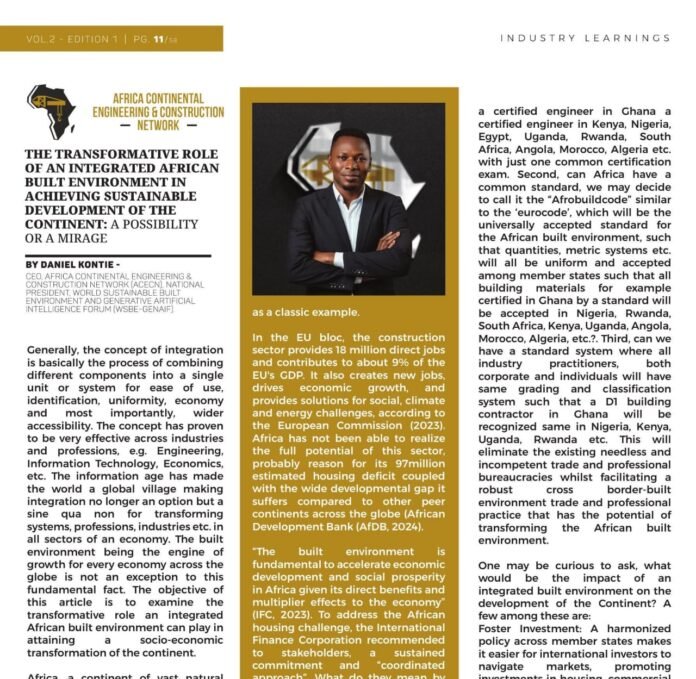By Daniel Kontie, Founder and CEO of the Africa Continental Engineering & Construction Network Ltd (ACECN)
Generally, the concept of integration is basically the process of combining different components into a single unit or system for ease of use, identification, uniformity, economy and most importantly, wider accessibility. The concept has proven to be very effective across industries and professions, e.g. Engineering, Information Technology, Economics, etc. The information age has made the world a global village making integration no longer an option but a sine qua non for transforming systems, professions, industries etc. in all sectors of an economy. The built environment being the engine of growth for every economy across the globe is not an exception to this fundamental fact. The objective of this article is to examine the transformative role an integrated African built environment can play in attaining a socio-economic transformation of the continent.
Africa, a continent of vast natural resources and cultural diversity, stands at a critical juncture in its developmental trajectory as rapid urbanization, population growth, and economic diversification reshape its future, the built environment emerges as a cornerstone in this transformation agenda. By integrating the built environments across Africa, we can create a unified framework for socio-economic transformation that addresses the continent’s unique challenges while unlocking its immense potential for global pre-eminence. The built environment has a significant transformative role in the development of a continent citing the European Union as a classic example.
In the EU bloc, the construction sector provides 18 million direct jobs and contributes to about 9% of the EU’s GDP. It also creates new jobs, drives economic growth, and provides solutions for social, climate and energy challenges, according to the European Commission (2023). Africa has not been able to realize the full potential of this sector, probably reason for its 97million estimated housing deficit coupled with the wide developmental gap it suffers compared to other peer continents across the globe (African Development Bank (AfDB, 2024).
“The built environment is fundamental to accelerate economic development and social prosperity in Africa given its direct benefits and multiplier effects to the economy” (IFC, 2023). To address the African housing challenge, the International Finance Corporation recommended to stakeholders, a sustained commitment and “coordinated approach”. What do they mean by this coordinated approach? Key among the IFCs recommendation of the need for a coordinated approach is the integration of the African built environment, the subject of this article, and one of the core objectives of the Africa Continental Engineering & Construction Network Ltd.
The question now is, can Africa have an integrated built environment such that all professions in the built environment will have a common curriculum for training and professional certification examination for all professionals across the continent?. This will make a certified engineer in Ghana a certified engineer in Kenya, Nigeria, Egypt, Uganda, Rwanda, South Africa, Angola, Morocco, Algeria etc with just one common certification exam. Second, can Africa have a common standard, we may decide to call it the “Afrobuildcode” similar to the Eurocode, which will be the universally accepted standard for the African built environment, such that quantities, metric systems etc. will all be uniform and accepted among member states such that all building materials for example certified in Ghana by a standard will be accepted in Nigeria, Rwanda, South Africa, Kenya, Uganda, Angola, Morocco, Algeria, etc.?.
Third, can we have a standard system where all industry practitioners, both corporate and individuals will have same grading and classification system such that a D1 building contractor in Ghana will be recognized same in Nigeria, Kenya, Uganda, and Rwanda? This will eliminate the existing needless and incompetent trade and professional bureaucracies whilst facilitating a robust cross border built environment trade and professional practice that has the potential of transforming the African built environment.
One may be curious to ask, what would be the impact of an integrated built environment on the development of the Continent?
Download your complimentary copy of the Global African Times Magazine to read the full article here.http://globalafricantimes.com/wp-content/uploads/2025/05/GAT-Magazine-Magazine-3-Mag-3.pdf

The Author, Daniel Kontie is a Ghanaian Entrepreneur and a Business Executive. He is the founder and CEO of the Africa Continental Engineering & Construction Network Ltd (ACECN), a leading Pan African Engineering and Construction Company in Ghana and Africa, Falcon 48 Developers and other affiliated companies. He developed ACEACRES, a Pan African Built Environment Summit aimed at Integrating the African Built Environment for Socio-economic Transformation of the Continent. Daniel received recognitions for his contributions to the engineering and construction industry in Ghana and Africa. His work and achievements demonstrate his commitment to innovation, sustainability and built environment integration. Daniel holds three (3) degrees, B.Sc. Economics, Catholic University, Bachelor of Laws (LLB), Central University and MBA in International Business, Nexford University.
Daniel Kontie can be reached via phone: +233209032280 and Email: d.kontie@acecnltd.com.
Website: https://acecnltd.com/.




